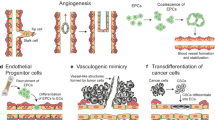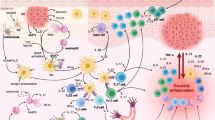Abstract
We established long-term cultures from skin tumors of nine patients suffering from classical Kaposi’s sarcoma (KS). Spindle cells obtained after enzymatic digestion were cultured on gelatin- or fibronectin-coated flasks in DMEM with 15% fetal calf serum, aFGF and heparin. Immunohistochemical staining was positive for MHC class I, laminin, type IV collagen, vimentin, α smooth muscle actin (20–40% of cells), caldesmon (20%), calponin (20–40%) and smooth muscle myosin (20–40%), and was negative for common leukocyte antigen, CD4, LFA1, CD34 and cytokeratin. Around 20% of cells up to the third passage in culture expressed the endothelial markers CD36, BMA 120 but were negative for UEA and Fc von Willebrand. Smooth muscle proteins were detected with immunoblotting. Using the polymerase chain reaction, human herpes virus 8 (HHV8) sequences were detected in primary cultures of three out of seven cell lines but were rapidly lost during in vitro passaging. KS-derived cells did not proliferate in serum-free medium, had a normal karyotype and did not grow in soft agar medium. Tumors formed in nude mice injected with KS-derived cells. The tumors were composed of mouse cells and were highly vascularized. Our results suggest that KS-derived cells are heterogeneous: the majority of cells have either a smooth muscle cell or a fibroblastic phenotype. Another minor cell compartment was composed of endothelium-derived cells. KS cells do not possess the characteristics of transformed cells in vitro and may be composed of polyclonal activated cells. Recombinant α interferon (rIFN) slightly inhibited the growth of KS-derived cells and increased the expression of MHC class I antigens. While cells were resistant to natural killer (NK) cell-mediated cytotoxicity, they became sensitive to rIFN-primed NK cells. Thus, the antitumor potential of rIFN against KS in vivo could result from immunomodulatory rather than from direct antiproliferative effects.
Similar content being viewed by others
Author information
Authors and Affiliations
Additional information
Received: 4 July 1996
Rights and permissions
About this article
Cite this article
Lebbé, C., de Crémoux, P., Millot, G. et al. Characterization of in vitro culture of HIV-negative Kaposi’s sarcoma-derived cells. In vitro responses to alfa interferon. Arch Dermatol Res 289, 421–428 (1997). https://doi.org/10.1007/s004030050215
Issue Date:
DOI: https://doi.org/10.1007/s004030050215




